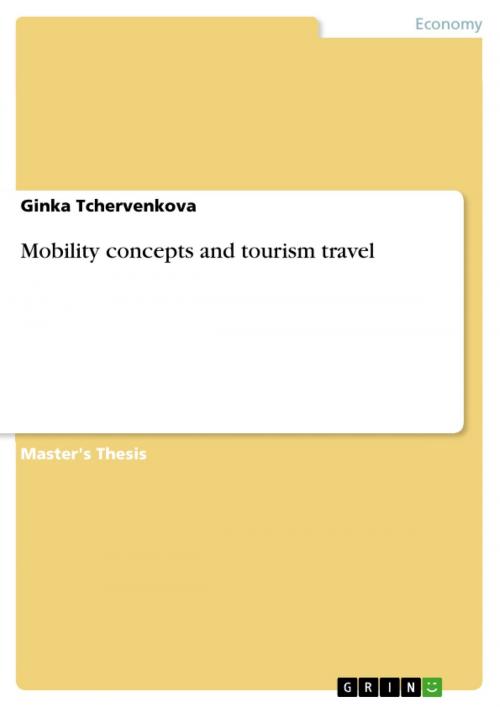Mobility concepts and tourism travel
Business & Finance, Industries & Professions, Hospitality, Tourism & Travel| Author: | Ginka Tchervenkova | ISBN: | 9783638442169 |
| Publisher: | GRIN Publishing | Publication: | November 24, 2005 |
| Imprint: | GRIN Publishing | Language: | English |
| Author: | Ginka Tchervenkova |
| ISBN: | 9783638442169 |
| Publisher: | GRIN Publishing |
| Publication: | November 24, 2005 |
| Imprint: | GRIN Publishing |
| Language: | English |
Master's Thesis from the year 2000 in the subject Tourism, grade: B+, Oxford Brookes University, 82 entries in the bibliography, language: English, abstract: Tourism development forecasts promise a continuing growth of the industry also in the future. At the same time, some academic and business circles begin to question more often whether the economic growth is a sustainable proposition and start to draw increasing attention to some aspects of the development, like the growing mobility and the environmental and capacity problems resulting from it. On one hand tourism creates or strongly contributes to their deepening, on the other hand these problems can have a reverse impact on its growth - not least because the very nature of tourism consists in the movement of people. These concerns raise the consideration to what extent the optimistic predictions for future tourism growth are realistic. The mobility issues are especially urgent in Europe, as it has a relatively small physical size and a leading position in the world tourism travel. The disinterest of European hotel and tourism establishments to the changes in travel mobility, the quite recent appearance of new mobility concepts and processes, and the lack of sufficient publications and studies on them, convert this dissertation into a grounding work in tourism analysis. The dissertation aims at answering the question about the impact of the new mobility concepts on the European tourism growth. In regard to that issue, it focuses on opposing the signals and perceptions from two information sources that are different in their nature but closely interrelated - the literature and the real world. It then identifies the areas of information overlapping and the place that has been assigned to the mobility concepts in the context of tourism. As a logical finalisation at the end, a discussion follows about the implications of the new mobility concepts for the European tourism industry. Through undertaking a grounding approach in the study of mobility and through the integration of this new area into tourism research, it became possible to identify the dimensions and issues in which the conducting of further and deeper research is highly recommendable. The dissertation draws conclusions about the impact of the new mobility concepts on the future tourism growth in Europe. In this way, it represents an initial attempt to fill the existing gap in tourism research - the gap called 'mobility'.
Master's Thesis from the year 2000 in the subject Tourism, grade: B+, Oxford Brookes University, 82 entries in the bibliography, language: English, abstract: Tourism development forecasts promise a continuing growth of the industry also in the future. At the same time, some academic and business circles begin to question more often whether the economic growth is a sustainable proposition and start to draw increasing attention to some aspects of the development, like the growing mobility and the environmental and capacity problems resulting from it. On one hand tourism creates or strongly contributes to their deepening, on the other hand these problems can have a reverse impact on its growth - not least because the very nature of tourism consists in the movement of people. These concerns raise the consideration to what extent the optimistic predictions for future tourism growth are realistic. The mobility issues are especially urgent in Europe, as it has a relatively small physical size and a leading position in the world tourism travel. The disinterest of European hotel and tourism establishments to the changes in travel mobility, the quite recent appearance of new mobility concepts and processes, and the lack of sufficient publications and studies on them, convert this dissertation into a grounding work in tourism analysis. The dissertation aims at answering the question about the impact of the new mobility concepts on the European tourism growth. In regard to that issue, it focuses on opposing the signals and perceptions from two information sources that are different in their nature but closely interrelated - the literature and the real world. It then identifies the areas of information overlapping and the place that has been assigned to the mobility concepts in the context of tourism. As a logical finalisation at the end, a discussion follows about the implications of the new mobility concepts for the European tourism industry. Through undertaking a grounding approach in the study of mobility and through the integration of this new area into tourism research, it became possible to identify the dimensions and issues in which the conducting of further and deeper research is highly recommendable. The dissertation draws conclusions about the impact of the new mobility concepts on the future tourism growth in Europe. In this way, it represents an initial attempt to fill the existing gap in tourism research - the gap called 'mobility'.















